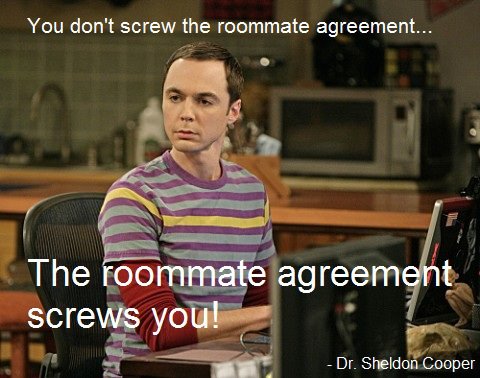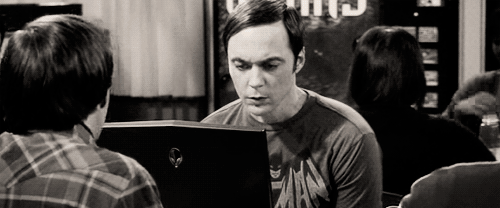As for now, we know how Sheldon scores in terms of openness to experiences and neuroticism. Today, we will add to this list agreeableness -- the next trait on the Big Five list. Agreeableness is a tendency to be pleasant and accommodating in social situations.
 |
| Source |
To answer this question we need to take a look at his behaviors and thoughts when he is in some kind of interaction with other people. It seems that a good relationship to consider is his friendship with Leonard, his roommate. Sheldon is a very atypical housemate, not only because of his 'customs' and habits, but due to his 'roommate agreement'. The latter is a very detailed legal document specifying the probable and less probable occurrences in life of both guys. It not only specifies when is the 'bathroom time' of each of the guys, but also what they are obligated to do if one of them is invited to Switzerland to see the CERN supercollider.
In case there is a tie, the agreement holds that Sheldon breaks the tie; when Leonard objected to this provision, Sheldon broke the tie to get his way. This example depicts really well that Sheldon is not a very agreeable person, he agrees only to things which are in his favor. In other cases, typically his 'roommate agreement' becomes handy to enforce his will.
Taking into account that Sheldon is always right, he can be seen as a person who agrees to disagree. Besides this, sometimes Sheldon gets what he wants by behaving in a childish way (e.g. by walking away and hiding in a comic book store, or by threatening to disclosure delicate information, like the relationship between Leonard and Priya to her parents).
 | ||||
| Sheldon threatening Leonard and Priya with email disclosure |
People low on agreeableness are not concerned with others' well-being and primarily like to compete rather than cooperate, which is at the core of Sheldon's character. Therefore, taking all these into account we would suggest that Sheldon has a very low score on this subscale of the Big Five.
Next week, drop in to read more about the extraversion trait of Sheldon's personality.



